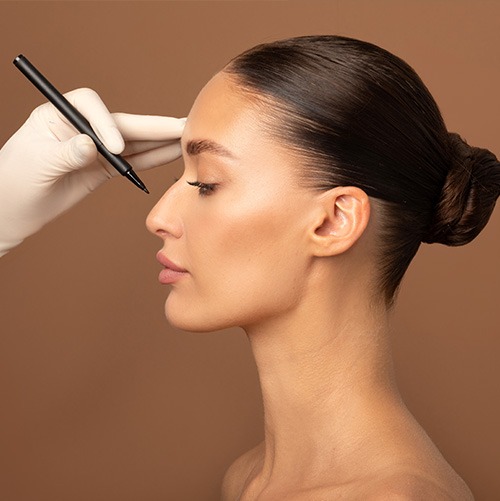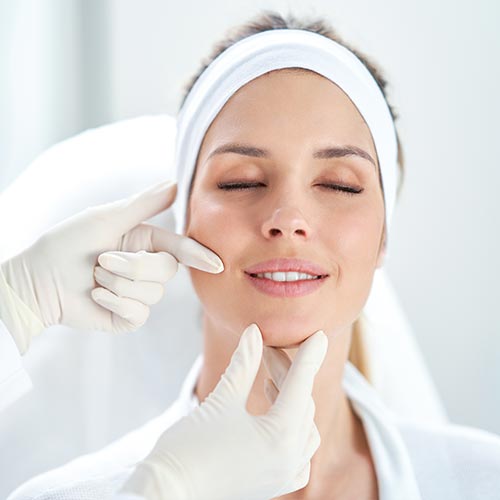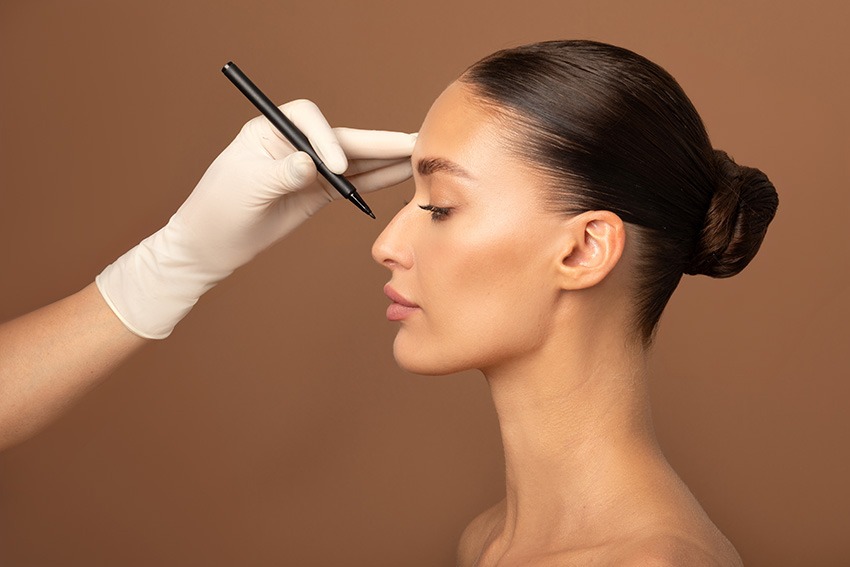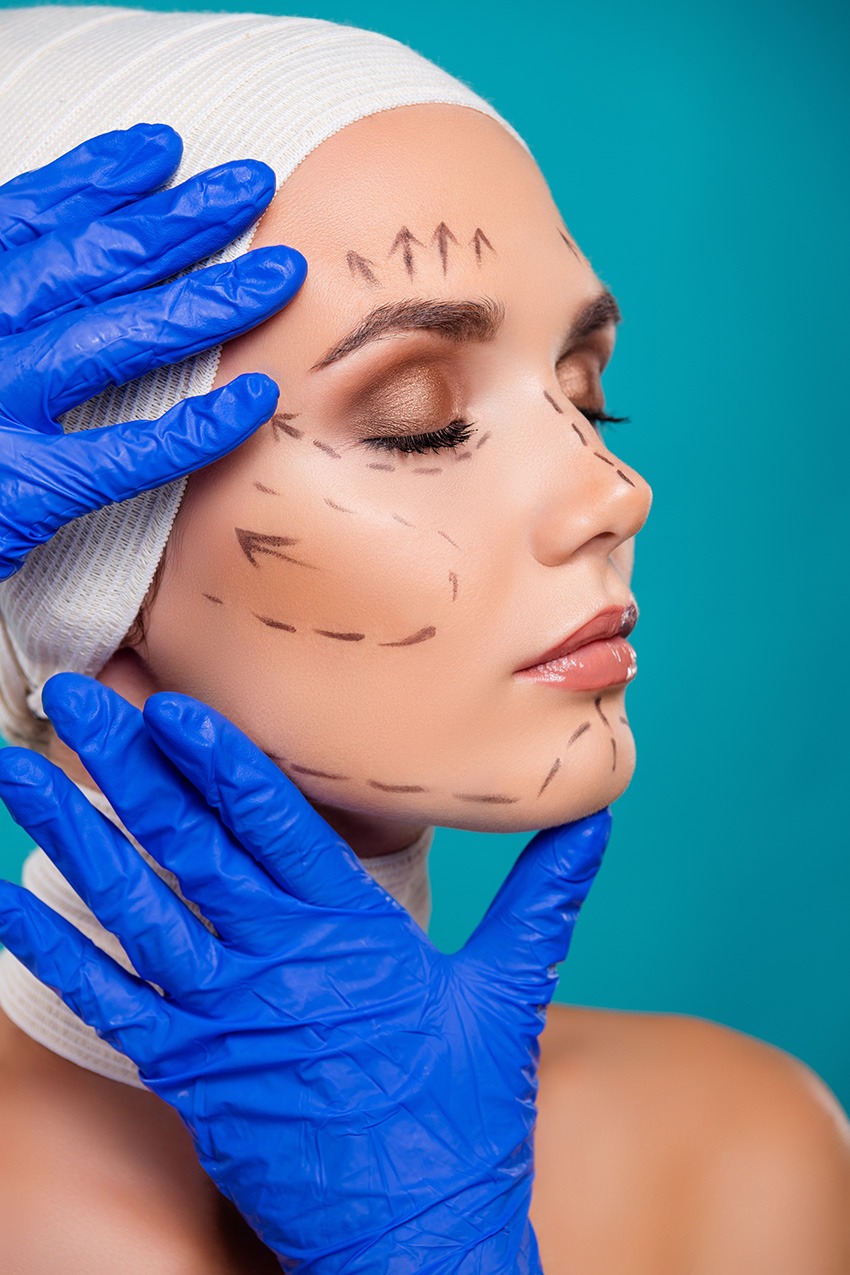Special Care for Quick Recovery After Facial Rejuvenation Surgery
The recovery process after facial rejuvenation surgery is crucial. Post-surgery care and follow-up play a significant role in ensuring a successful and smooth recovery. In this blog post, we will go through the steps you need to take to complete the recovery process as effectively as possible. By reading this guide, you can manage the post-surgery period more comfortably and efficiently.


İÇİNDEKİLER
Cold Packs to Reduce Swelling and Bruising
Swelling and bruising after facial rejuvenation surgery are among the most common complaints for many patients. While this is a normal part of the post-surgery recovery process, it can still be uncomfortable.
Cold packs are a simple and effective method to help reduce swelling and bruising on the face. The cold constricts blood vessels, helping to minimize blood accumulation and speed up circulation, which in turn reduces swelling and bruising. For the first few days, you can regularly apply cold packs to reduce swelling in your face.
There are a few different options for cold packs. The first is to wrap an ice pack in a clean cloth and gently press it against the swollen areas on your face. This can help reduce swelling as well as alleviate pain. Another option is to place chilled tea bags from the refrigerator over your eyes. The antioxidants in the tea bags can help fight swelling.

Stitch Care and Monitoring: Minimizing Scars with Proper Care
After facial rejuvenation surgery, stitch care and monitoring are crucial to minimize scars. Proper care can significantly reduce the appearance of surgical scars. It is essential to keep the stitches clean and follow the recommended care instructions carefully. Applying cold packs to the stitches during the first few days can help reduce swelling and bruising, speeding up the healing process. Later, stitches may need to be partially or entirely removed. Regular check-ups and following your doctor’s instructions during this period will help ensure proper healing.
Keeping the stitch areas clean reduces the risk of infection. Proper skin hygiene supports wound healing and prevents infection. During the recovery process, you may also use special makeup techniques recommended by your doctor to camouflage the scars. These products even out skin tone without affecting the healing stitches.
Regularly monitoring and caring for your stitches will expedite healing and assist in minimizing scars. It is essential to follow your doctor’s prescribed treatment plan carefully during this time. Additionally, adhering to physical activity restrictions is critical in reducing strain on the skin, which helps minimize scarring.
Pain Management: Effective Strategies for Post-Surgery Comfort
Pain after facial rejuvenation surgery can be concerning for patients. However, by using proper pain management strategies, you can make this process more comfortable. Several effective methods are available to reduce post-surgery pain.
It is important to regularly take the pain medications prescribed by your doctor during the recovery period. These medications are designed to relieve pain and help you relax. By taking the prescribed dosage of medication regularly, you can keep the pain under control.
You can use cold packs to reduce swelling and bruising that may occur after the surgery. In the first few days, applying a cold compress or frozen towels to your skin can help relieve pain and swelling. However, be careful not to apply the cold directly to your skin and limit the application to 15-20 minutes.
Adequate rest and sleep are extremely important after surgery. You need to get enough sleep and rest so your body can focus on the healing process. You can ensure a comfortable sleep by paying attention to your sleeping position on a comfortable bed. Additionally, using the correct sleeping positions can minimize skin tension and reduce pain.
Soft Diet: Careful Attention to the Mouth Area
Facial rejuvenation surgery is a popular option for many people who want to reverse the effects of aging and look younger. However, there are a few important factors to pay attention to after the surgery. One of these factors is nutrition. A soft diet can help protect the mouth area post-surgery and accelerate the healing process.
After surgery, you may experience swelling, bruising, and sensitivity in the face. Therefore, it is important not to rush the recovery process and to treat your face with care. A soft diet can relax the facial muscles during this process and support the healing process.
This soft diet includes easily chewable and swallowable foods such as soupy foods, pureed foods, and warm beverages. These will allow you to nourish yourself without disturbing the stitches around the mouth and causing unnecessary tension. This can speed up the healing process and reduce the risk of infection.
Examples of Soft Diet:
- Soups (vegetable soup, chicken broth soup)
- Soft fruits (banana, avocado, peach)
- Pureed vegetables (carrot, zucchini, potato)
- Fruit juices (apple juice, orange juice)
- Soft dairy products like yogurt, pudding, custard
In addition to a soft diet, you should not forget that careful care is required for the mouth area after facial rejuvenation surgery. You should follow the methods recommended by your doctor to keep the stitch areas clean and reduce the risk of infection. You can use moisturizing and soothing products to support the natural healing process of the skin around your mouth.
Sleeping Positions: Minimizing Skin Tension
One of the important factors to pay attention to after facial rejuvenation surgery is sleeping positions. The right sleeping position can minimize skin tension, speed up the healing process, and help achieve better results. Here are the appropriate positions and things to keep in mind after facial rejuvenation surgery:
Keep Your Head Elevated: Keeping your head elevated after facial rejuvenation surgery helps reduce swelling and speeds up the healing of bruises. Placing two pillows on your bed or using a special bed riser are effective ways to maintain this position.
Sleep on Your Back: Sleeping on your back is crucial to prevent skin tension. Sleeping on your side or stomach can restrict movement in the face and complicate the healing process, leading to unwanted results. While sleeping on your back, ensure that your pillow is low, firm, and supportive.
Avoid Sleeping on Your Side: Sleeping on your side after facial rejuvenation surgery can cause skin tension and increase swelling. Therefore, it is important to avoid sleeping on your side as much as possible. If you prefer to sleep on your side, placing a pillow on one side and keeping your face elevated can make things easier.

Sun Protection: Protecting Your Skin from UV Rays After Surgery
Facial rejuvenation surgery is a commonly preferred procedure to reduce signs of aging and achieve a younger appearance. After the surgery, there are several important factors to consider, one of which is sun protection. UV rays can increase the sensitivity of your skin after surgery and negatively affect the healing process. Therefore, it is essential to take sun protection measures to shield your skin from UV rays.
Use Sunscreen: After surgery, your skin may be treated and sensitive. Therefore, it is crucial to use sunscreen during the recovery period. By choosing a high-SPF sunscreen, you can effectively protect your skin from UV rays. It is also important to consult your doctor before applying sunscreen.
Avoid Sun Exposure: Sunlight can irritate your skin, especially after surgery, and cause side effects. Therefore, avoid going outside during the sun’s peak hours (noon). Additionally, use protective accessories such as sunglasses, hats, and long-sleeved clothing to shield your skin from the harmful effects of the sun.
Stay in the Shade: One of the most effective ways to protect yourself from the sun is to avoid direct sunlight and stay in shaded areas. During the recovery period, avoid staying outdoors for long periods. If you need to be outside, prefer sitting in shaded areas. This will protect your skin from UV rays and help accelerate the healing process.
Skin Care: Keeping Stitch Areas Clean and Reducing Infection Risk
Proper skin care is crucial for patients who undergo facial rejuvenation surgery. Keeping the stitch areas clean after surgery not only reduces the risk of infection but also speeds up the healing process. It is important to take precautions and follow proper cleaning techniques to protect the stitch areas.
One of the most important steps in keeping stitch areas clean is ensuring your hands are hygienic. Start by washing your hands with soap and water for at least 20 seconds. Then, disinfect your hands using an antiseptic solution or antibacterial gel. This helps minimize the risk of infection after surgery.
After facial rejuvenation surgery, it is important to use appropriate antiseptic solutions to keep the stitch areas clean. Gently clean the stitch area with a mild cleanser or soap. Additionally, it is better to use lukewarm or cold water instead of hot water to cleanse your skin. Hot water can irritate the skin and negatively affect the healing process. Avoid direct contact with the stitch areas and clean with gentle touches.
Moisturizing and Skin Care: Choosing Products Compatible with New Skin
Skin care is crucial after facial rejuvenation surgery. Selecting the right products is essential to speed up the healing process and ensure that the new appearance lasts longer. Moisturizing and skin care are key steps to maintaining the skin’s moisture balance, supporting the healing process, and reducing the risk of irritation and infection.
It is important to choose compatible products for moisturizing and skin care after surgery. Considering the skin’s sensitivity, the specific needs of the healing process, and the products that can be used post-surgery, it is important to follow your surgeon’s recommendations. Moisturizers suitable for your skin type and products formulated for sensitive skin should be preferred. Additionally, products containing active ingredients such as hyaluronic acid, known for their moisturizing effects, help maintain the skin’s moisture balance.
Skin care, in addition to moisturizing, also includes regular cleansing and protection steps. A cleansing routine should be established to keep the stitch areas clean and reduce the risk of infection. It is important to gently clean your skin using a soft, pH-balanced cleanser. Furthermore, a high SPF sunscreen should be used to protect the skin from harmful UV rays from the sun. This helps protect the skin from sun damage.
Topical Medications and Creams: Supporting Skin Healing
After facial rejuvenation surgery, the skin begins the healing process. During this time, various topical medications and creams can be used to support the skin’s healthy recovery. Using the right products after surgery can speed up the healing process of scars and minimize them. Topical medications and creams can reduce inflammation, prevent infection, and help maintain the skin’s moisture balance.
There are several factors to consider when using topical medications and creams after facial rejuvenation surgery. First and foremost, it is important to use the products recommended by your doctor. The skin may be sensitive post-surgery, and unsuitable products can harm the skin. Using the topical medications and creams prescribed by your doctor regularly is crucial to support the healing process.
Topical medications and creams are generally applied to the skin and absorbed. Therefore, the application method is very important. You should apply the topical products carefully and massage them into the skin until fully absorbed. This will ensure the product penetrates the skin and works effectively.
Another important aspect to know about topical medications and creams is using them at the correct frequency. You should consult your doctor to learn how often and when to use the products. This is essential to maximize skin healing.
Physical Activity Limitations: Moving Properly After Surgery
For those undergoing facial rejuvenation surgery, moving properly and limiting physical activities are crucial to ensuring a successful recovery process. Moving slowly and cautiously after surgery helps support the skin’s healing. By following your doctor’s recommendations, you can apply the right strategies for movement during the recovery period.
To move properly during the post-surgery period:
- Avoid lifting heavy objects after surgery.
- Be mindful not to bend your head or neck excessively.
- Take frequent breaks to rest and avoid straining muscles by moving slowly.
Smoking and Alcohol Consumption: Factors Affecting the Recovery Process
There are many factors to consider after facial rejuvenation surgery, and one of them is smoking and alcohol consumption. While the harmful effects of smoking and alcohol on the body are well known, many people are unaware of how they impact the healing process.
Smoking
Smoking introduces harmful substances like nicotine and carbon monoxide into the body, which negatively affect blood circulation and reduce oxygen levels. Tissue regeneration and wound healing are essential during the recovery process after aesthetic surgery. Smoking can disrupt these processes, prolong recovery time, and accelerate skin aging, thereby reducing the lasting effects of facial rejuvenation surgery.
Alcohol
Alcohol consumption is another factor that can affect the recovery process. Alcohol can lead to dehydration, disrupting the moisture balance required for skin tightening and healing. Additionally, alcohol can have a negative impact on the immune system, increasing the risk of infection. It can also elevate the risk of bleeding and delay wound healing. Therefore, it is advised to avoid alcohol consumption during the post-surgery period.
Avoiding Stress: The Role of Mental Health in Strengthening Recovery
For patients undergoing facial rejuvenation surgery, stress management is crucial. The physical and mental changes during the post-surgery period can lead to anxiety and concerns for many patients. However, avoiding stress and strengthening mental health can contribute to a faster and more effective recovery process.
Stress can trigger many physiological and psychological responses that have negative effects on the body. Stress during the surgery process can hinder the healing process and increase the risk of infection. Therefore, managing and reducing stress is essential.
Special Makeup Techniques: Using the Right Products During the Recovery Process
After undergoing facial rejuvenation surgery, it is important to use the right makeup techniques. Choosing products that are suitable for your skin post-surgery can support the healing process and enhance the appearance of the results.
First, the skin after surgery is often sensitive and may be red. Therefore, selecting soft and soothing makeup products is a wise choice. Using mineral-based, hypoallergenic, and fragrance-free products can help you apply makeup without irritating the skin.
Secondly, it is important to choose the right concealer to cover surgical scars. Instead of heavy concealers, opting for a lighter and creamy formula provides a more natural look on the skin. Applying the concealer with gentle touches and blending it thoroughly helps minimize the appearance of scars.